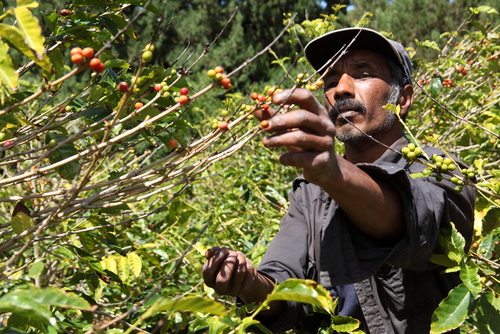The movement was born and extended to food crops, often grown by small farmers in Central and South America. That led to fair trade co-ops, so that individual farmers could have more leverage in negotiations with big buyers, who often do not want to deal with small groups (we have the same issue here - if the New York Times will give away digital ads for free to a company buying print ones, why buy ads on a smaller site like Science 2.0?) because of the value versus logistics.
But, like organic food, fair trade has become a behemoth in its own right. Fair Trade USA is the top corporation in the country for certifying products and making sure they get that 'fair trade' sticker. Like certifying organic food, the process is not all that rigorous, despite their claims. Yet competitors want them to be penalized because they are trying to be too successful.
Equal Exchange Inc. was founded in 1986, as disastrous legacy farm subsidy policies in the US were driving small farmers out of existence, to help small farmers - but in another country. They wanted to stick it to Ronald Reagan for his embargo of the mass-murdering dictator running Nicaragua (who, in fairness, replaced another mass-murdering dictator, but at least that former one was not a communist, which really bugged Reagan) so they started importing Nicaraguan coffee, ironically in unethical and illegal fashion, for being an organization founded on a positive belief system. In contrast to the perception of small farmer advocacy in America (basically, communism), the group has maintained strong ties with religious groups. But Equal Exchange says it takes the small farm aspect of fair trade more seriously than Fair Trade USA and so they have challenged a giant specialty coffee sales group, Green Mountain Coffee Roasters, Inc. to stop using Fair Trade USA. Because Fair Trade USA certifies farms that are too large.
Are they just being purists? Staying in my mid-1980s motif, as a young guy, I know people who stopped listening to U2 after their second album because they claimed the band had 'sold out'. What is the real ethical line between a co-op and a farm of the same size? It seems to be rather arbitrary. If you are selling through Equal Exchange you are on the right side of the line. They want Green Mountain Coffee Roasters to stop using Fair Trade USA because they worry that larger farms will be competing with their co-ops.
Well, they always were, they just were not using the 'fair trade' label. If you are not in the advocacy business but instead in the fairness one, the most important question would likely be 'Has FTUSA lowered the standard or are these large plantations now paying acceptable wages and treating workers better to get certified?' - if so, that is what small farm advocates have sought all along, a fair trade for laborers. That's a win for not just small farmers who, let's face it, own farms, butalso laborers on farms who, let's face it, own nothing.

Should conditions be improved even for workers who do not own farms? Photo: Shutterstock.
I have bought more Keurig machines than I can count. I get a shipment of coffee from Green Mountain Coffee Roasters every month. To my knowledge I have never consciously bought a particular coffee because of a 'fair trade' sticker because to me, it is just marketing, like buying an organic pineapple or anything equally silly. I buy the coffee I like, not a sticker. Still, ethics matter. I also love Coca-Cola and they used to have a plant in South Africa during Apartheid in the 1980s. That never bothered me because if you don't want to overthrow evil communists in Nicaragua you can't overthrow evil bigots in Africa either. But when Coke responded to protests and sold the plant to, basically, their subsidiary in South Africa to look like they were divesting, I boycotted them. It was completely ethical to stand their ground and implicitly endorse racism or communism or anything else by not endorsing anything and just doing business, if they chose. It was unethical to do a cultural head fake, pretend to care, and then still own the company there.
Fair Trade USA says it is being inclusive, and that being able to certify large farms will help improve conditions for workers on those farms. Equal Exchange says allowing large farms to be called fair trade is unethical on general principle because 'fair trade' competition will hurt smaller farmers. But only about 10 percent of coffee growers are in farming co-operatives. What about the other 90% of coffee workers, much less others? Should their conditions not be improved because they did not inherit a farm?
They might both want to watch out for a completely different problem. Starbucks told the Associated Press it is moving ahead with its own fair trade standard, created with Conservation International, called Coffee and Farmer Equity, or C.A.F.E. When Starbucks gets into your business, you had better watch out.





Comments